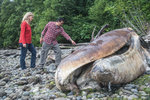About three weeks ago, a starved adult male gray whale washed up on shore in Mats Mats Bay. Multiple marine mammal organizations were struggling to find a place to take it to decompose until a local couple volunteered their private beach in Port Hadlock.
This item is available in full to subscribers.
We have recently launched a new and improved website. To continue reading, you will need to either log into your subscriber account, or purchase a new subscription.
If you had an active account on our previous website, then you have an account here. Simply reset your password to regain access to your account.
If you did not have an account on our previous website, but are a current print subscriber, click here to set up your website account.
Otherwise, click here to view your options for subscribing.
* Having trouble? Call our circulation department at 360-385-2900, or email our support.
Please log in to continue |
|



About three weeks ago, a starved adult male gray whale washed up on shore in Mats Mats Bay. Multiple marine mammal organizations were struggling to find a place to take it to decompose until a local couple volunteered their private beach in Port Hadlock.
The smell, they said, is not that bad from their house on a bluff above the beach, and will only last for one to two months, while the body will take much more time to completely disintegrate.
Today the whale’s rib bones are exposed and blackened by the leathering skin. White and brown- red organs spill from the burst belly. Its fluke is bloated and red, with a tethering rope around it to keep the carcass from drifting away at high tide. If you stand downwind about ten feet, the unmistakable smell of decomposition is easily overpowering.
The most jarring thing about it is the sound. From up to five feet away you can hear the flies buzzing on its skin, a sound like rushing water.
Stefanie Worwag and her husband Mario Rivera first became involved with the whale through their volunteer work at the Marine Science Center. When a marine mammal washes up on shore, they are part of a network of volunteers that spring into action to either rescue the living or evaluate the dead before coming up with a plan for disposal.
Called the Marine Mammal Stranding Network, volunteers take a one-day course in how to assess stranded marine mammals.
If they had not taken the whale, Rivera and Worwag said they do not know where it would have gone instead, because there was almost no other nearby location available. The couple thought their property was perfect because the house sits high above the beach on a bluff, their closest neighbors are about a half-mile away and the private stretch of beach does not get very much foot traffic.
Rivera and Worwag moved to Jefferson County three years ago, after living and traveling in an RV full time.
“We were kind of looking for a home base,” Rivera said. “And we looked at tons of different places but then when we found this it was just perfect.”
The couple first got involved with the Marine Science Center last year after participating in an Earth Day beach clean-up Worwag said.
“We’re both very interested in animals, nature, ecosystems, that’s one of the reasons we live here,” Rivera said.
A little while after taking the whale, the National Oceanic and Atmospheric Administration posted the couple’s story on their website, looking for more property owners who will volunteer to house dead gray whales as the number washing up on shore in Washington this year has reached a record of 30 whales.
From there the story was picked up by Seattle’s King 5 News, then it went to the AP wire, and then it was everywhere.
Rivera said they are surprised with the amount of media attention the whale has attracted. They’ve been interviewed by local Q13, the BBC, The New York Times and NPR and they have friends across the US and the globe who have called them to say they’ve read their story.
“The guy at NOAA told me this reached the UK, New Zealand, Brazil, Australia and all over the United States,” Rivera said.
Worwag said she thinks part of the attention could be due to increased awareness of the gray whale. She said scientists still do not know why so many gray whales are washing up on shores. It could be due to climate change or increased population sizes or something else entirely.
“I was thinking, we can’t be the first people to have a whale on their beach,” she said. “But I guess maybe we’re the first ones to voluntarily take one in.”
Since their story has spread, Rivera said their contact at NOAA told him they’ve had seven or eight people volunteer to take whales.
While the whale decomposes, they’ve been doing a little bit of an experiment, putting lime on it to see if it will decompose faster. They think that may have reduced the smell, and now will stop the lime to see if there is any change in the rate of decomposition.
“It smells just like the mill, I think,” Stefanie Worwag said, “but stronger. It’s intermittent, it’s not constant. It depends on the wind, the heat, the time of day.”
The couple said they have not noticed any wildlife feeding on the animal, which they think could be due to the chemical treatment. They said they have noticed more eagles in the area circling overhead but none have come to down to feed.
Rivera and Worwag said, after the whale is gone, they would gladly take another one if the need presented itself. They urge people who are considering their own properties as a possible place to house whales to consider their neighbors and the distance to their house before they decide to take the leap.